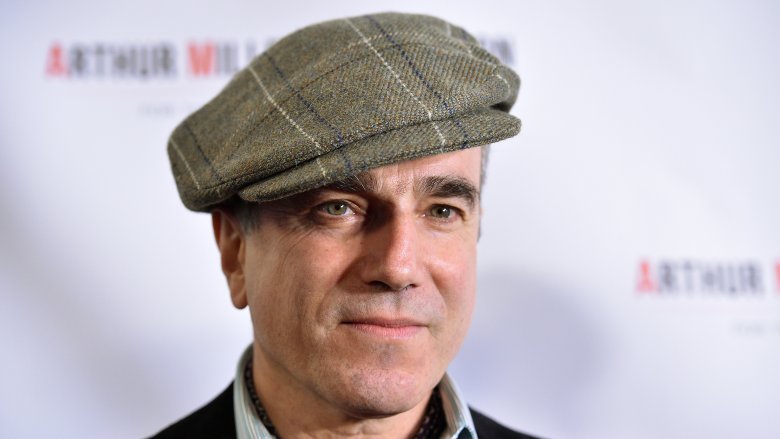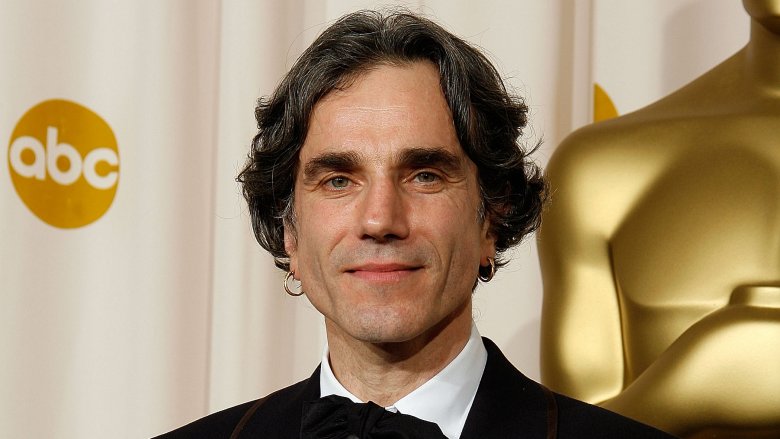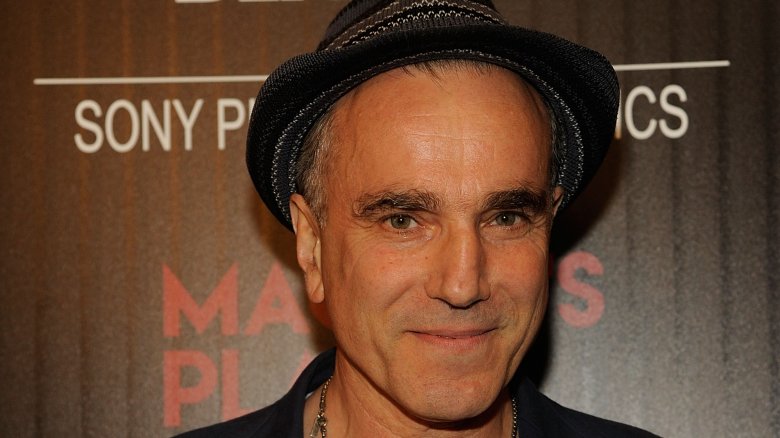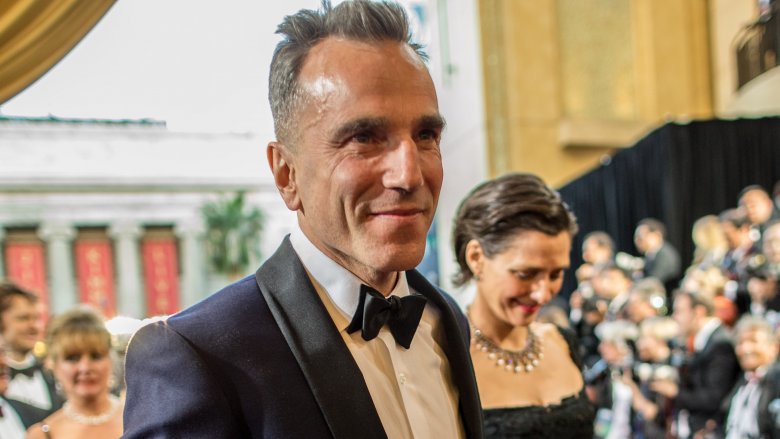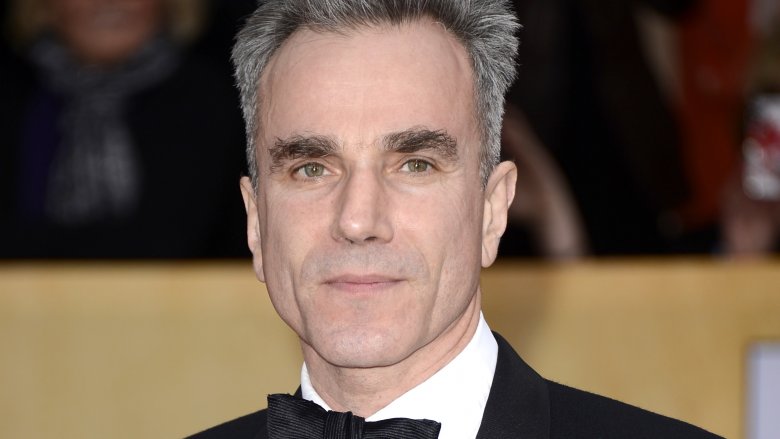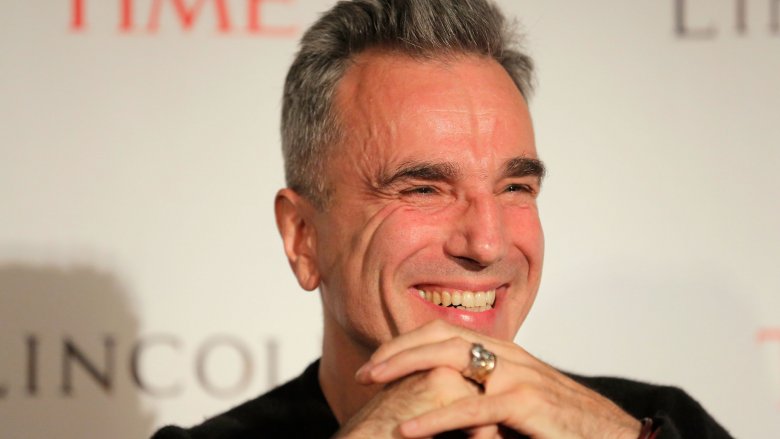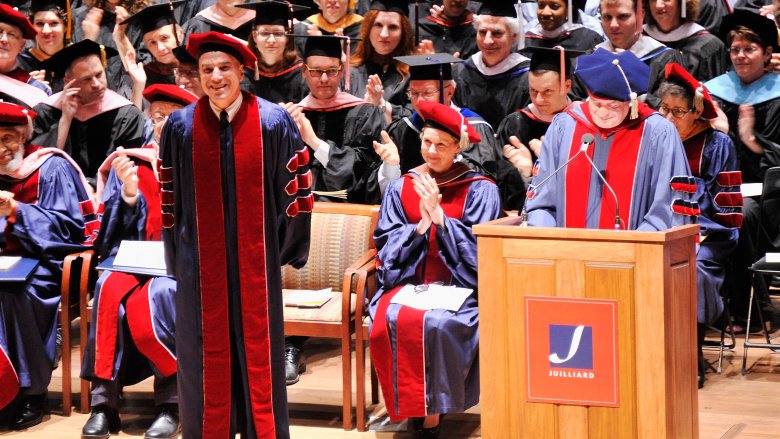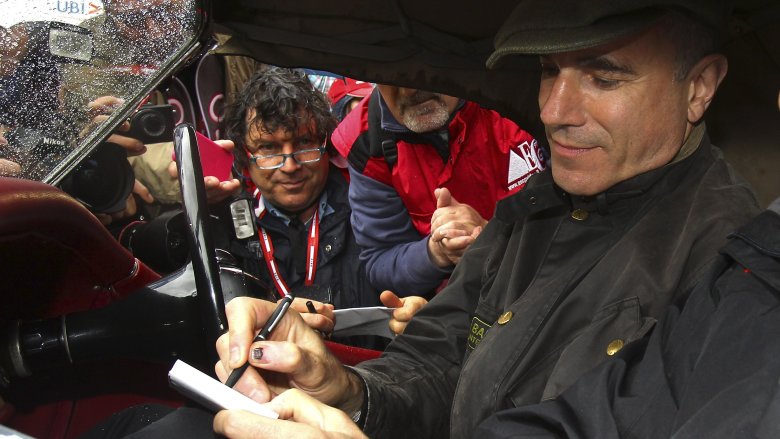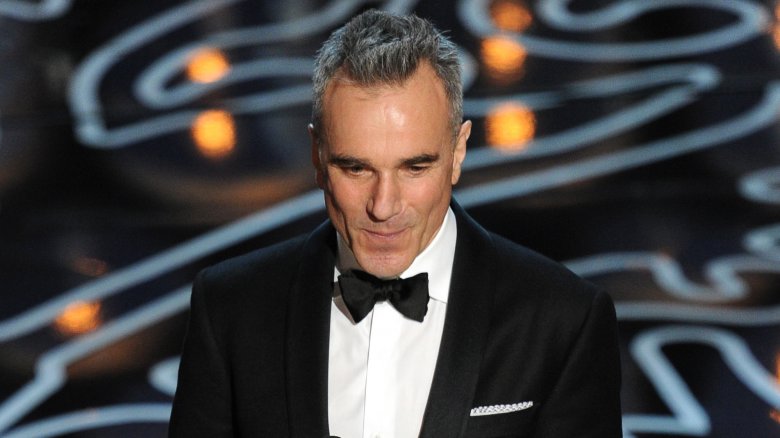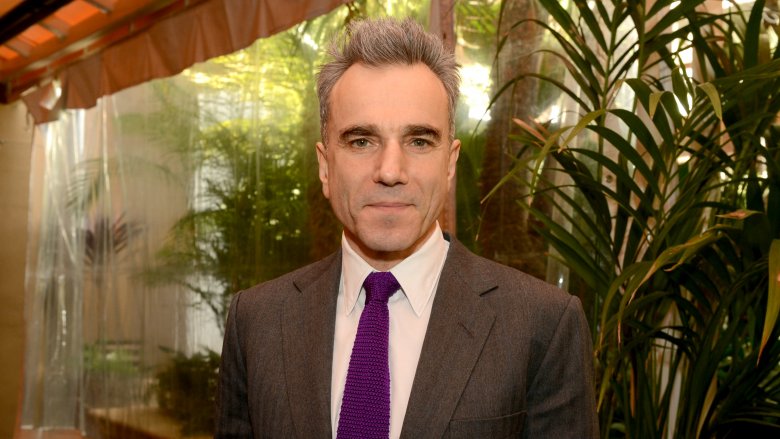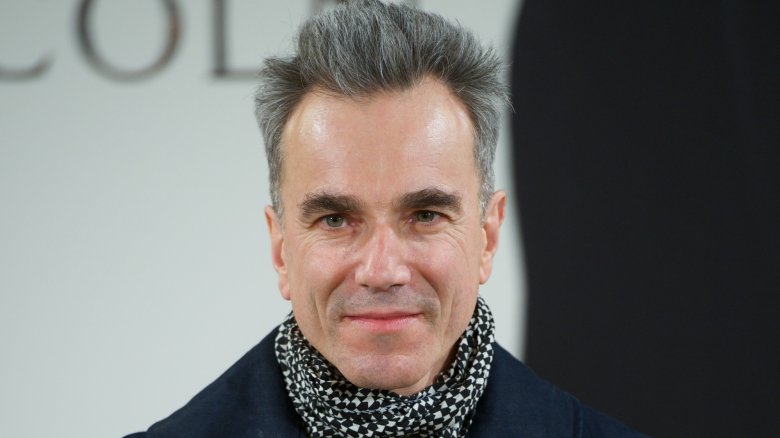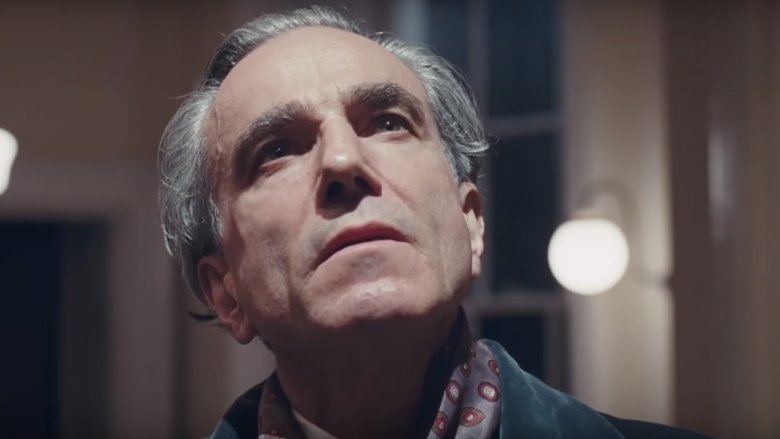The Real Reason Daniel Day-Lewis Quit Acting
After more than three decades in the movie industry, three-time Oscar winner Daniel Day-Lewis has decided to hang up his hat.
As Day-Lewis' representatives told Variety, his 2017 film with There Will Be Blood writer-director Paul Thomas Anderson, a '50s-set dress designer drama titled Phantom Thread, will be the last installment in his esteemed filmography. "He is immensely grateful to all of his collaborators and audiences over the many years," their statement read. "This is a private decision and neither he nor his representatives will make any further comment on this subject."
The notoriously private thespian may not be willing to elaborate publicly, but he has plenty of reasons to leave Hollywood's bright lights behind.
His method acting style is hard work
It's no secret that Daniel Day-Lewis takes a very unique approach to his craft. Not only is he exceedingly choosy about which roles he'll accept, but he's also known to disappear into them throughout the production process. He stayed in a wheelchair and was spoon-fed by crewmembers to fully experience having cerebral palsy for his Oscar-winning turn in My Left Foot; he spent six months in the wild to prepare for his role in The Last of the Mohicans; he isolated himself from the cast and crew during production on The Ballad of Jack and Rose; he tattooed his hands and trained for 18 months as a fighter for The Boxer. The results speak for themselves, but all that dramatic heavy lifting has to take a toll.
Others don't understand his style
Of his much-fussed methodology, Day-Lewis told The BBC, "it makes complete sense to me, the way I work ... part of my job is to be drained. You absorb and you nourish yourself. You feed yourself for whatever period of time, in this case a year, and then your job is to more or less to drain yourself for whatever it is that you have to offer."
As he told The Telegraph, he knows others find his approach bizarre, but he just can't operate any other way. "I needed—and I still need—to create a particular environment. I need to find the right kind of silence or light or noise. Whatever is necessary—and it is always different. I know it sounds a little fussy and a little ridiculous, but finding your own rhythm is one of the most important things you can discover about yourself ... I couldn't do this work at all unless I did it in my own rhythm."
He's also admitted that the work can sometimes feel very lonely, as he sometimes won't even speak to co-stars during production, but sometimes his co-stars do understand his approach. Sally Field, who starred as his wife in Lincoln, admitted to texting him in character during production to admonish him for wasting time with limericks when he should have been working.
Finishing movies makes him sad
Day-Lewis has been hinting at calling it quits for decades. Not only is the work itself grueling, but once he's done with a role, he has to deal with the emotional repercussions of letting it go. As he told The Telegraph, "There's a terrible sadness. The last day of shooting is surreal. Your mind, your body, your spirit are not prepared to accept that this experience is coming to an end. You've devoted so much of your time to unleashing, in an unconscious way, some sort of spiritual turmoil."
Known for taking years between projects, Day-Lewis is clearly choosy with his films—but the time off might have been driven just as much by his need to recalibrate emotionally. "Even if it's uncomfortable, no part of you wishes to leave that character behind," he added. "The sense of bereavement is such that it can take years before you can put it to rest."
He's had trouble getting out of character
After finishing Gangs of New York—for which he'd learned to gut carcasses like a real butcher, learned how to throw knives from circus performers, and listened to Eminem on repeat to maintain a level of angry energy—Day-Lewis admitted to speaking with his Butcher dialect for months after the film's completion and felt a sense of alienation during the film's debut. "I got nervous before the premiere," he recalled. "I knew I'd also feel a sense of sadness. Now I have to accept that the film is complete and no longer has anything to do with me."
He has a second career...as a cobbler
He was showered with decades of praise for his work in front of the camera, but Day-Lewis ultimately sought a different level of fulfillment in his side career as a cobbler. After shooting The Boxer, he started a family with his wife Rebecca Miller, and apprenticed in Italy with master shoemaker Stefano Bemer. "It's an antidote to this other thing I do," he told Rolling Stone. "Most particularly, perhaps, because you see this visible evidence, you have this tangible thing at the end, and if you f*** up, you can see it very clearly and do it again. It's not a matter of opinion. It's either good or it's bad."
Fixing shoes might seem like a strange passion for an Oscar winner, but as we've seen countless times, it can be hard for a celebrity to stay grounded in the spotlight. Working with one's hands to produce work you can point to at the end of the day seems like a great way to stay centered.
He's considered retiring before
Day-Lewis thought about ending his screen career around the same time he started his apprenticeship as a cobbler. In fact, before he was recruited by Martin Scorsese to star in Gangs of New York, he told The Telegraph he'd all but given up on acting. "I was not thinking about going back to work ... When Martin told me about Bill the Butcher in Gangs of New York, I wanted to change places with that man. But even then, I did not say yes right away. I kept thinking, 'I'm not sure I can do this again.'"
He's also been known to enjoy woodworking during his downtime, and even built some of the sets for one of his wife's directorial efforts. As he told the New York Times, he was drawn to carpentry because "The life of a cabinetmaker seemed infinitely more pure."
He wants nothing to do with fame
Even at the peak of his career, Day-Lewis retreated from the public eye for years between projects to spend time on his family farm in Ireland, where he's often spotted visiting the pubs to have a pint—alone. Unlike a number of his more outgoing colleagues, he's rejected the notion that he's a public figure at all times. "I am, whether I like it or not, a public figure during certain periods," he explained to The BBC. "Then I disappear, it seems. To people from the outside, I seem to disappear. Of course in my experience I don't disappear, I'm just doing other things. What I'm doing is re-engaging with life. And it's that period of time that allows me to do the work. So these two things are indivisible."
The movie industry has changed
At this point, given his weight and merit as an actor, any movie starring Day-Lewis earns special attention—which undermines his interests in making movies in the first place. As he told The Telegraph, "The work itself is never anything but pure pleasure, but there's an awful lot of peripheral stuff that I find it hard to be surrounded by. I like things to be swift, because the energy you have is concentrated and can be fleeting. The great machinery of film can work against that."
In today's Hollywood, that machinery seems larger and louder than ever—and it's left less room for the quieter sorts of character studies Day-Lewis tends to favor. Instead, studios are looking for intellectual properties with proven brand value, which means lots of sequels, reboots, remakes, and cinematic universes. To an actor who built his career on taking emotional and physical risks, it may no longer be worth working within those constraints.
Nowadays, with studio budgets often overblown and great expectations placed on pictures that might feature such a legendary lead as Daniel Day-Lewis, there's a chance the pomp and circumstance and lightning speed press coverage surrounding his attachment to any movie might be getting to be too much for the intensely guarded actor.
He's going out on top
When Day-Lewis won the Best Actor Oscar for Lincoln in 2012, he made Academy Awards history by becoming the only actor to win three trophies in that category. Although there are others who've won three Oscars—namely, Jack Nicholson and Walter Brennan—their prizes were split between categories. This isn't to say Day-Lewis has ever acted for the acclaim, but once you've set such a high bar for yourself, there's really nowhere else to go but down.
He's 'retired' before
This seems like the real deal, but Daniel Day-Lewis has walked away from acting before—more than once, in fact. He left a stage production of Hamlet in the middle of a show because he thought he was interacting with the ghost of his dead father. He took five years off after The Boxer, and planned a five-year sabbatical from acting after Lincoln.
"I just wanted some time away from it all. I need that quite often," he told The Guardian. "And I have felt like that ever since I got into acting. When I was younger, I made some decisions that I shouldn't have. And, in hindsight, I've almost always been wrong when I haven't listened to myself. I have quite a strong feeling about when I should work and when I shouldn't." Evidently, Day-Lewis is still going with his gut—and walking away from the spotlight at last.
His last film was the last straw
Day-Lewis' final film, the 2017 release Phantom Thread, affected him so much he later said he had no intention of watching it—in fact, it solidified his desire to walk away from acting altogether.
"I need to believe in the value of what I'm doing. The work can seem vital. Irresistible, even. And if an audience believes it, that should be good enough for me. But, lately, it isn't," Day-Lewis told W Magazine. "I did want to draw a line. I didn't want to get sucked back into another project. All my life, I've mouthed off about how I should stop acting, and I don't know why it was different this time, but the impulse to quit took root in me, and that became a compulsion. It was something I had to do."
As for why this movie in particular evoked that sense of urgency to end things, he said he and writer-director Paul Thomas Anderson "laughed a lot before we made the movie. And then we stopped laughing because we were both overwhelmed by a sense of sadness. That took us by surprise: We didn't realize what we had given birth to. It was hard to live with. And still is."
Day-Lewis added that he felt a similar sense of grief over his decision to retire, telling the magazine, "How strange would it be if this was just a gleeful step into a brand-new life. I've been interested in acting since I was 12 years old, and back then, everything other than the theater—that box of light—was cast in shadow. When I began, it was a question of salvation. Now, I want to explore the world in a different way."
